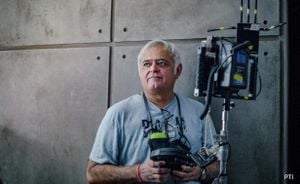Resolute Mining, the Australian gold miner, is making headlines after its CEO, Frank Dufour, has been released from detention in Mali. This ordeal began when Dufour was taken by security forces due to rising tensions over the company’s operations in the country and their potential environmental impact.
For some background, Resolute Mining has been active in Mali for several years, primarily extracting gold at its Syama mine, which is known for being one of the deepest underground gold mines globally. Operated by Resolute since 2014, the Syama mine has faced scrutiny from local communities and governmental authorities, primarily due to reports of environmental degradation and insufficient engagement with local stakeholders.
The release of Dufour came after intense negotiations, underscoring the precarious nature of mining operations in Mali, particularly at a time when the country deals with political instability following the military coup of 2020. Local sentiments concerning foreign mining companies are often mixed, with promises of jobs and investment juxtaposed against fears of environmental harm and non-compliance with local regulations.
On his release, Dufour stated, "I’m relieved to be back with my team and thankful for the support we received from various stakeholders during this challenging period." The reaction to his detention and subsequent release has sparked debates about regulatory practices and corporate responsibility within Mali's mining sector. Many local observers argue it highlights the need for greater transparency and dialogue between mining firms and communities affected by their operations.
Resolute Mining faced its latest challenges amid growing tensions over ownership rights and operational practices. The expertise and track record of foreign companies often raises questions among the people living near mining sites, leading to protests and concerns about potential exploitation and environmental irresponsibility.
Looking forward, the company aims to strengthen its relationships and improve communication with the local communities. Resolute indicated intentions to hold public forums and discussions to address concerns, as engagement has become increasingly necessary for operational continuity and social license to operate.
Mineral resources like gold continue to be of significant importance to the Malian economy, accounting for nearly 80% of total exports. Nevertheless, there’s increasing pressure on mining companies to operate sustainably and ethically. Resolute stated it recognizes the need for greater community involvement and has implemented several programs aimed at fostering local development.
Industry analysts are closely monitoring how Resolute responds following this incident. The perspective of local stakeholders is gaining traction as activists push for more significant roles for communities impacted by mining activities. The focus on responsible mining practices highlights the balancing act companies must perform to maintain profitability and safeguard community interests.
Even within the international mining community, there’s been pushback against operations perceived as harmful to local environments or which neglect the rights of indigenous populations. Resolute Mining’s recent setbacks might signal larger shifts for mining operations across Mali and potentially beyond.
Despite the difficulties faced, Resolute remains optimistic about the future of its operations. The company has hinted at upcoming development projects aiming to capitalize on its existing assets and to find new avenues for exploration and production within the region.
For now, Dufour’s release could be seen as both relief and opportunity—a chance for Resolute to reassess its approach and strategy within Mali. The global community will be watching closely as the company navigates the complex relationship between economic imperatives and social responsibility.



